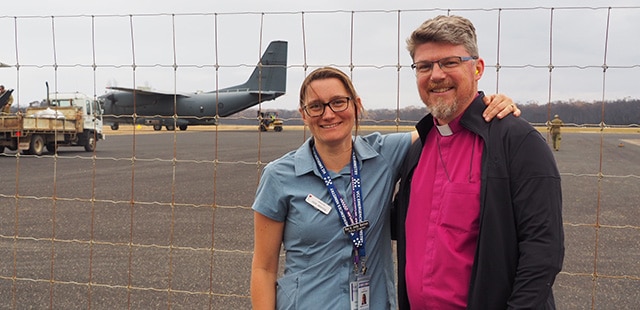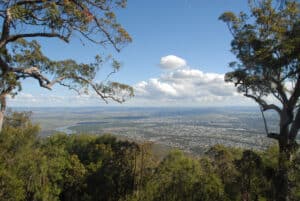The Revd Jude Benton, who was on the ground during the East Gippsland bushfires, on how best to support people in a crisis.

By Jude Benton
12 May 2020
The Revd Jude Benton, priest-in-charge of the Cooperating Parish of Croajingolong, was on the ground during the devastating Mallacoota and Cann River bushfires and has stayed and served the community since then. Here, she offers her advice on how clergy and congregation members can best support people during crises like bushfires, and highlights some of the common responses by well-meaning people that can actually make life harder.
She says: “Please, if you’ve done any of these after a crisis, don’t feel guilty. I have too. But this is what I’ve learned this year, and so I pass it on for next time there’s a crisis.”
1. People in crisis are unable to process information properly. Their brains are running on high adrenaline which causes a narrowing of vision / understanding to what is essential for survival right now. Complex offers of assistance, or requests for information beyond the essentials, are difficult to process. Almost everything non-essential will be forgotten.
2. The basic requirements for normal life may not be re-established for some time. After the fire we had no power at home for 18 days. That meant only a gas hob to cook on, using torches at night, fridge and freezer defrosting, no washing machine, no hot shower, no ability to charge a phone or computer at home. We also had to wear masks down the street, the roads were closed, the supermarket was running low, the smell of smoke was everywhere, and our garage and backyard were a burnt and twisted pile of wreckage. Yet we both continued to work dawn till dusk despite these challenges.
3. Admin is not a priority for the first few weeks. Adrenaline calls for action, not sitting doing admin. On top of this there are only two mobile networks in Mallacoota, and one crashed for three weeks – that’s the one my iPad usually uses for emails. Without power at home I needed to go to the church to power the laptop (after power was re-established there about day five) and use a weak mobile hotspot to download messages. The first time I logged on it took more than 24 hours to download an inbox full of emails.
4. Keep the phone line clear. Imagine a parallel relationship between the length of time you’ve known the person and how close your relationship is, and then translate that into how long it should be before you phone them. My phone went constantly the first four weeks, with many calls from people I didn’t know. Each phone call was exhausting, and while I was on one call, the message bank would fill up with more to respond to. I had no energy left for calling parishioners or even my family and friends for support. As mentioned before, charging a mobile was an effort. Turns out those old corded landlines are a Godsend in an emergency! A month on, the person will be more appreciative of your call than in the first few days or weeks.
5. Keep contact to business hours. Do you enjoy being rung by strangers, about work issues, at home at 9pm on a Saturday? No, and neither does the exhausted disaster worker. It wasn’t uncommon for phone calls to start at 8am and finish late in the evening. People in disaster need rest, time to recover, and opportunity to communicate with family and friends. Be professional and keep their evenings free.
6. Give money not goods. Australia is a wealthy country, with a government and organisations that provide essential food, toiletries etc for relief in the immediate period after a disaster. Then a second disaster happens as well-meaning people deliver more and more food, clothing and goods that are unnecessary and require exhausted volunteers to spend hours sorting and even redistributing to other communities. If you are going to give goods, ask first what is required (noting points #4 and #5) and ensure that everything is good quality before it is sent. The best clothing delivery we had was all good quality, washed, bagged into categories and labelled, for example “women’s summer tops size 8-12”.
7. Give money with an open hand. A common phone call went like this: “I want to give you money, but I want it to be used for ‘XYZ’, and I want you to ensure that the right people get it …”. If you choose to give, trust the person / organisation you give to to use it wisely. Requests like the above added considerable unnecessary stress, and to me undermined what the churches’ role in a disaster is: to be there for all people. We are truly grateful to those who gave generously and with open hands as this allowed us to ensure that the churches’ ministry could be maintained through this period as well as using funds to bless the community for the long term, rather than just the immediate when there were multiple other agencies available for instant money.
8. Give time for decision making, for recovery is a marathon not a sprint. Imagine walking through a swamp. That’s how a post-crisis brain operates. It takes three to six months before the post-adrenaline exhaustion even begins to wear off and for normal creativity and reasoning to be re-established. Offers of assistance may initially be rejected as it seemed too complicated, but later on the bits of the jigsaw fit together and the offer will be accepted. Be patient. Give space and allow for changes of mind. Four months in and we’re only just beginning to work out what a longer-term plan is (or at least we were until COVID-19 happened). This is the time where we need all the ethereal offers of help to become reality. This is the time for other organisations and unknown people to call and offer genuine support and longer-term partnership. If your initial call was ignored in the first month or so, try again now that people have more ability to look ahead rather than just being overwhelmed by the immediate circumstances.
9. Prayer is powerful; pray for the people. The expression “held in the prayers of the people” was very true to me over the immediate fire response. I felt out of my depth, exhausted, and so busy that prayer was elusive, yet in all this I felt closer to God and held in the prayers of others than I’ve ever felt before. Not sure what to pray? Pray for wisdom, health, energy, compassion and courage to keep going.
10. Ask before rushing in to visit with a group. A traumatised community is a sensitive and emotional being. Due to people being evacuated and slowly returning it took close to two months before the whole church congregation had regrouped. Well-meaning people wanted to rush in with groups and “cheer us up” but we needed space and time to be alone, to re-live and re-tell the stories, and to grieve together. Wait three to four months before you begin to talk about bringing a group to a disaster zone, and six+ months before you actually do it … and when you come, don’t take photos of the damage or the locals will chase you with pitchforks.
The Revd Jude Benton is priest-in-charge of the Cooperating Parish of Croajingolong (Mallacoota, Genoa and Cann River). She is supported in her ministry by the Bush Church Aid Society.
If you would like to support bushfire recovery in Gippsland or Wangaratta through the Melbourne Anglican Foundation, please click here.






